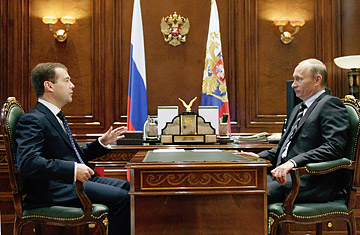
Russian President Dmitry Medvedev (L) meets with Prime Minster Vladimir Putin (R) outside Moscow in Gorki on May 20, 2009.
Months of infighting between Russian Prime Minister Vladimir Putin and President Dmitry Medvedev over Russia's budget ended on Monday — with Medvedev on top. At a meeting with senior government officials, the President announced a strikingly pessimistic set of spending priorities until 2012, based on conservative estimates suggesting that Russia will remain hampered by the economic crisis into next year and beyond.
Putin's more optimistic forecasts, which some saw as an attempt to fend off political instability, "suffered a radical readjustment," wrote the daily Nezavisamaya Gazeta. "We all understand what a difficult situation our country, our economy, is in," Medvedev said as he announced that budget expenditures would exceed revenues for the first time in 10 years. He said the government would move "to a strict regime of saving budget resources" along the lines championed by bearish Finance Minister Alexei Kudrin. (See pictures of Putin.)
Although Medvedev did not give a new estimate for the GDP decline in 2009, he said this year's budget deficit will be at least 7% of GDP — "and that's an optimistic forecast." On Friday, government figures for the first quarter showed the economy shrank at an annual rate of 9.5%, a radical revision after officials forecast in February that Russia's GDP would decline by only 2.2% this year. The International Monetary Fund has predicted that Russia's GDP could drop as much as 6% this year. "In 2009, unfortunately, we expect a sharper fall in the GDP than we had thought," Medvedev said. (Watch an interview with TIME's 2007 Person of the Year, Vladimir Putin.)
After the meeting, Finance Minister Kudrin said the government was drafting a new GDP forecast of its own that would "take into account all anti-crisis measures, which means the plunge will be greater" than previous estimates. He added that he expects inflation of around 13% this year.
Kudrin said that even a 5% budget deficit — lower than Medvedev's new prediction — would be enough to exhaust the government's $113 billion Reserve Fund, which is generated mostly through oil and gas export revenues. But he said that since the government is tightening spending and basing its budget on "conservative" oil price forecasts of $50 a barrel in 2010, $52 in 2011 and $53 in 2012, he believes the fund could begin replenishing itself as early as in 2011. Part of the reason for Russia's current predicament is earlier over-optimistic estimates for oil revenues, which make up anywhere between a third and a half of Russia's budget. (See pictures of Russians celebrating Victory Day.)
Kudrin also told the press that Russia will not turn to the International Monetary Fund for help, but that the country would consider borrowing more than $7 billion from overseas in 2010 and an additional $10 billion over the following few years. But his emphasis was on lower outlays: "A review of spending, a transition to targeted spending and saving — these are the key words in the next three years," he said. In an apparent swipe at comments by Putin and his team, the Finance Minister said, "There are some optimistic forecasts that there will be some growth next year, but this in no way changes our priorities in the budget process."
"Medvedev is clearly listening to Kudrin here, suggesting that the government will become much more austere in its spending," said Alexie Moisseev, a chief analyst at Renaissance Capital, a leading investment bank in Moscow. "Maybe this time around the Russian government will become more conservative and balance its budget in a more proactive way." (Read: "Putin to the West: Hands Off Ukraine.")
For Vladimir Osakovskiy, strategy and research head at Unicredit Bank, "The major message was that in the future the government will develop the budget using conservative oil price estimates. What we're seeing right now is an effort to clean up the mess." And what analysts will be eyeing with increased interest in coming months is whether the differences over the budget mark a new stage in Russia's most important political relationship: the one between Medvedev and Putin.
